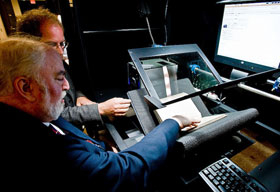  |
| HOME | THIS ISSUE | CALENDAR | GRANTS | BACK ISSUES | < BACK | NEXT > |
University Libraries to play major role in consortium’s mass digitization projectby Suzanne Zack - October 1, 2007 | ||||
| Many public domain materials at the University Libraries will soon be freely available on the Web, as part of a collaborative project to digitally scan and make such materials accessible through a universal digital archive. The University of Connecticut Libraries, along with 18 other institutions in the Boston Library Consortium, recently agreed to scan more than 10 million pages from books no longer in copyright into the Open Content Alliance holdings during the next two years. The Boston Library Consortium is the first large-scale consortium to embark on such a self-funded project with the Open Content Alliance. Open Content Alliance is a group of 40 cultural, technology, nonprofit, and governmental organizations from around the world that is creating an archive of multilingual digitized text and multimedia content to make rare and unusual material in the public domain part of a permanent online archive. The Alliance is one component of the Internet Archive, a non-profit organization dedicated to maintaining an online library and archive of web and multimedia resources, including legacy web sites. “This is a major step toward making the world’s literary and cultural heritage freely accessible on the Web,” says Brinley Franklin, vice provost for University Libraries, “and our decision to scan a million pages in two years makes the UConn Libraries a principal player in this important, not-for-profit, international initiative.” The Open Content Alliance is an alternative plan to Google’s book digitization initiative, through which millions of books will be scanned and made searchable on the Internet exclusively through Google’s proprietary search engine. At the Google site, users won’t be able to print materials easily or read more than small portions of copyrighted works online, but will have to go to libraries and booksellers for the full text. “The Open Content Alliance will keep public domain content in the public domain, without restrictions,” says Franklin. “Our library staff were unanimous in their desire to make UConn’s rare and unique materials freely searchable on the Web, without having to use a specific company’s web browser to find those materials.” Since its inception in 2005, the Open Content Alliance has been supported by the Alfred P. Sloan Foundation. Doron Weber, program director for universal access to recorded knowledge at the foundation, says the Alliance is creating digital information in the public interest, rather than the shareholder’s interest.
The Sloan Foundation is sponsoring a summit on open access to information in conjunction with the Boston Library Consortium, and has vowed to continue its support in light of the Consortium’s mass digitization commitment. The Open Content Alliance operates regional scanning centers in six cities that scan up to 12,000 books – more than four million pages – each month. Boston Public Library has allocated space for the Alliance to operate 10 scanners at its Northeast Regional Open Content Alliance Scanning Center. The scanning center is currently working on Boston Public Library’s John Adams collection, and on the Biodiversity Heritage Library, which includes collections from Harvard, the Marine Biological Laboratory, and Woods Hole Oceanographic Institution. Boston Library Consortium members will begin scanning out-of-copyright materials from their collections later this fall. In the initial stages of the project, the UConn Libraries will focus on the history of New England, especially Connecticut. Staff will begin scanning materials later this fall. The materials will be available via the archive about a month after they are scanned. In the future, UConn hopes to integrate electronic resources involving maps via its Map and Geographic Information Center (http://magic.lib.uconn.edu) and photographs through Connecticut History Online (http://cthistoryonline.org). Other Boston Library Consortium partners plan to cover topics such as the history of science and engineering (Brown, MIT, Northeastern, and Tufts); Jesuit materials (Boston College); Judaica (Brandeis); Machiavelli (Brown); and other subjects from a historical perspective. To view the Open Content Alliance archive, go to http://www.archive.org/ |
| ADVANCE HOME UCONN HOME |

